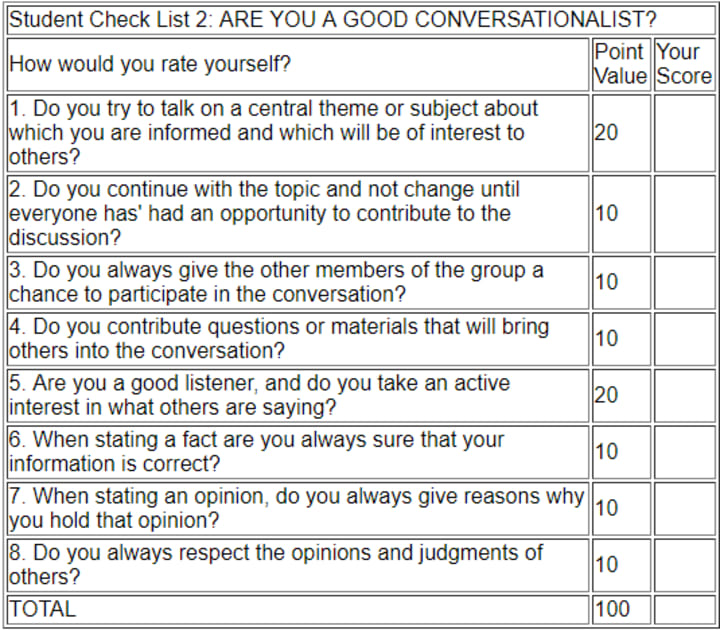Persuasive Speech: How Can We Improve Our Conversation?
Conversation is our primary means of communication. Every day of our lives we converse with other people; in fact, we spend more time in conversation than in any other speech activity.

Our conversations cover a wide range of speech topics, for it is through conversation that we express our ideas, our beliefs, our feelings, and our opinions. In short, by means of conversation, we make ourselves understood and understand others. We are judged by others according to our conversation. There are many reasons for wanting to become a better conversationalist.
Being a good conversationalist helps us to make friends. For example, Margaret would like to talk about herself, but she is afraid Helen would not be interested. Helen, who is a good conversationalist, encourages Margaret to discuss her own life. Thus, Helen finds a friend in Margaret, the person who will listen to her.
Being a good conversationalist helps us to help others. For example, not only is Helen helped because she has made a friend, but Margaret is also helped. People need to discuss their ideas and their problems. Such discussions are usually good for them. Since Helen was a good conversationalist, she was able to help Margaret.
Being a good conversationalist helps us to formulate our ideas. For example, Richard has, for some time, been wondering how the student council could work to keep the school clean of trash and dirt, but he has not been able to organize his ideas. In a good conversation with Joan, Frank, and Gretchen, his ideas took form, and he was able to present a program for clean-up to the Council.
In order to understand what is meant by conversation, let us examine some which take place: high school sweethearts talk for hours; casual friends converse while riding to school; a student and teacher talk after class; the President talks to a little girl on Christmas Eve; or two diplomats talk at an embassy party.
These talks, or conversations, involve two or more people; they are, more than likely, for enjoyment. They are casual, and they are loosely organized. When conversations become organized, they become discussions. The main difference between the discussion and the conversation is one of the degrees of organization and planning.
A good conversation has a central theme or subject. The theme may be any worthwhile topic that is interesting and stimulating, such as how to develop a winning baseball team; how to improve honesty in the locker room.
IT TAKES TWO OR MORE TO KEEP A CONVERSATION ROLLING.
The people involved in a good conversation: (1) are interested in the subject, (2) have something worthwhile to add or say to the others, and (3) are interested in what the others have to say. Together, they keep the conversation "rolling".
To answer fully the question, HOW CAN WE IMPROVE OUR CONVERSATION? Let us begin by considering how we might improve our conversation in each of the features we have mentioned.
1. Establish a Subject
A good conversationalist is well-informed. He knows things. To improve our ability to converse, we must vary our own experiences. The good conversationalist will do many and varied things: participate in sports, travel, gardening, drawing; learn how to repair mechanical devices; learn how to fish or sew; learn how to prepare an outdoor meal, and so on. A good conversationalist will listen to the experiences of others and ask questions about what is said. He will read newspapers, magazines, and books in many fields; listen to radio programs; and see television shows, plays, and motion pictures of a varied nature.
Our ability to converse is directly proportional to the scope of our interests. We can and must make a deliberate effort to increase both our interests and our experiences, if we are to raise our conversational batting average.
2. Develop Interest
If we are well-informed, then the goal in conversation is to select subjects in which all those taking part have an interest. When two people meet, the overlapping of their experiences produces subjects for conversation. Mutual experiences develop interest. How enjoyable it is to talk to someone who visited Mexico last summer as you did! What fun it is to talk to someone who is interested in fly-casting, as you are!
So, the good conversationalist is, first, well-informed, and, second, one who chooses from his information a subject that is interesting to the person or persons to whom lie is talking.
The technique of a good conversation begins with the selection of a topic in which you believe others have an interest. Then, make a sincere effort to determine if others participating in the conversation are really interested. Finally, if they are not interested and cannot participate, change the subject to something in which the interest is more general.
A conversation must not be one-sided; everyone participating must contribute information and interest.
3. Contribute Worthwhile Information
Conversation can be improved if those taking part will contribute good information and ideas. Just because you know a lot about a subject does not insure a successful conversation.
Those concerned must correctly choose appealing topics to make a conversation interesting.
The selection of what to say in a conversation is a different kind of skill from those discussed above. It requires making a choice between the things that are available to say. How can your choices be improved?
DRAW OTHERS INTO CONVERSATION WITH TOPICS OF INTEREST TO WHICH THEY CAN CONTRIBUTE.
Contribute materials that are needed to bring others into the conversation. Suppose the subject is fishing, and the group has been concentrating on salt-water fishing. If you know that one of the group fishes mainly in Minnesota's fresh-water lakes, you might ask: "How does this compare with fishing in Minnesota, Harry?"
Contribute what you believe to be your special knowledge. Perhaps in Maine last summer you learned some special information about whaling customs from an old sea captain. Such new information should appeal to the group.
Answer the questions asked of you, but keep your answers short. For example, someone might ask, "Didn't you catch big bass up in Michigan last summer?" Answer the question but do not go on and on, putting in all the details. Give someone else a chance to talk.
Contribute ideas and information on the conversation at hand. Change the subject only when the group will benefit. If the subject is fishing, do not abruptly shift the topic to sailing unless you ask permission of the group to do so. You might say, "If you don't mind, I'd like to shift the subject of conversation to sailing."
When stating an opinion, give your reasons for holding such an opinion. There is nothing more deadly to conversation than the person who is "for" or "against" something but will not say why. He may say, "I do not believe in having any fish and game laws." When asked why not, and told that this might lead to a serious shortage of fish and game, he simply says, "I'm just against them, that's all." This refusal to clarify is harmful to constructive conversation.
If these suggestions are kept in mind when talking to others, you will find that conversation can be a very enjoyable pastime.
4. Dos and Don'ts
DOS
DO speak so that all can hear.
DO look directly at those participating in the conversation.
DO use variation in voice and language. Sound animated! BUT AVOID "OVER-SPARKLE".
DO be sincere. Don't gush!
DO choose language carefully for accuracy and clarity. Watch out for overworking the same expressions.
DON'TS
DON'T dominate the conversation either by talking too much or by passing continual judgment on the remarks of others.
DON'T continually interrupt others.
DON'T exaggerate or minimize your own contributions.
DON'T insist on changing the subject against the will of the others, unless you have a very good reason for doing so.

Exercises
1. Name the three best conversationalists among your friends and evaluate them on each of the "DOS" and "DON'TS" listed further below.
2. Divide into groups. Let each group pick a subject for conversation and present it to the class. Each conversation should last approximately 6 to 10 minutes. Some suggested subjects for the conversations are as follows:
Going Steady-Is it Good or Bad? If a High School Student Is Permitted to Drive the Family Car, What Restrictions should the Parents Place upon Him?
Does Crime Pay on Television? What Is the Best Type of Vacation to Take? Does the Average American Waste Too Much Money Being Stylish?
How Much Money Do You Want to Make? Should Some Form of Military Training (such as High School R.O.T.C.) Be Made Standard in All High Schools?
3. Make a list of the subjects that you would really like to discuss informally with others. Your list should include at least five topics. Your instructor may choose to tabulate all of the subjects offered by the class on the blackboard. If so, note the frequency of duplications in the lists.
4. Write an essay on a recent conversation in which you participated. This conversation may have taken place at a church gathering, a social function, a ball game, or at any other place where you and your friends talk informally. List the participants in the conversation, the subjects covered, and discuss how the conversation met the "DOS" and "DON'TS" of conversation listed in this chapter.
5. Listen to a conversation in which you are not taking part. Jot down some notes and report your evaluation of the conversation to the class.
6. Analyse, in terms of "DOS" and "DONTS", some current television program that consists largely of group discussion or informal conversation.
7. Evaluate yourself with the "DOS" and "DON'TS" as a conversationalist.






Comments
There are no comments for this story
Be the first to respond and start the conversation.